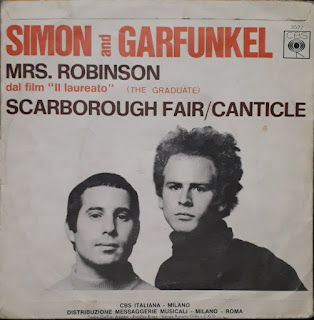SIMON & GARFUNKEL - SCARBOROUGH FAIR / CANTICLE
Publicació: 10 d'octubre de 1966 (àlbum) febrer de 1968 (single)
Llistes: EUA: #11
"Scarborough Fair" és una balada tradicional anglesa que presenta una sèrie de tasques impossibles donades a un antic amant que resideix a Scarborough, al nord de Yorkshire. Ewan MacColl es va fer ressó el 1947 d’una melodia que interpretava Mark Anderson, un miner jubilat de Middleton-in-Teesdale, al comtat de Durham, Anglaterra. Al llarg dels anys, la cançó ha estat enregistrada per diversos músics, incloent-hi la versió icònica de Simon & Garfunkel a la dècada de 1960, que la van aprendre de Martin Carthy, una figura destacada en l'escena de la música folk.
Carthy va aprendre la cançó d'un llibre de cançons de MacColl i Seeger i la va incloure al seu àlbum homònim de 1965. El mateix any, Paul Simon va aprendre "Scarborough Fair" de Martin Carthy mentre estava a Londres. Simon & Garfunkel van incorporar la cançó al seu repertori, combinant-la amb "Canticle", una reelaboració de la lletra de la cançó antimilitar de Simon de 1963 "The Side of a Hill", posada a una nova melodia principalment composta per Art Garfunkel. La peça combinada, "Scarborough Fair/Canticle", va servir com a pista principal del seu àlbum de 1966 "Parsley, Sage, Rosemary and Thyme" i va guanyar més popularitat després de ser inclosa a la banda sonora de la pel·lícula "The Graduate" el 1968.
Carthy va acusar Simon d'apropiar-se del seu arranjament sense donar-li crèdit. El 2000, Simon va fer un gest amistós convidant Carthy a interpretar la cançó junts en un espectacle a Londres. Carthy va acceptar la invitació, deixant de banda les seves diferències. Simon va admetre que la seva versió de la cançó estava molt influenciada per l'arranjament de Martin Carthy, però no era conscient de la necessitat de reconèixer-ho com a tal. Posteriorment, Simon va arribar a un acord monetari amb l'editor de Carthy, amb la intenció que rebes una part. No obstant això, més endavant es va saber que Carthy no va rebre ni un cèntim de l'acord.
Scarborough Fair era un esdeveniment reconegut a l'Anglaterra medieval, conegut per atreure comerciants, artistes i visitants de diverses regions. La fira, que durava 45 dies i començava anualment el 15 d'agost, era una trobada important per al comerç i l'entreteniment. Amb el temps, "Scarborough Fair" va evolucionar cap a una cançó folk popular, cantada pels bardes mentre viatjaven de poble en poble, fent més palesa la seva importància cultural en el folklore anglès. Avui, Scarborough segueix sent una ciutat tranquil·la amb un passat ple d'història, orgullosa del seu ric llegat històric.
SIMON & GARFUNKEL - SCARBOROUGH FAIR / CANTICLE
Released: October 10, 1966 (album) February 1968 (single)
Charted: US: #11
"Scarborough Fair" is a traditional English ballad featuring a series of impossible tasks given to a former lover who resides in Scarborough, North Yorkshire. The melody was collected by Ewan MacColl in 1947 from Mark Anderson, a retired lead miner from Middleton-in-Teesdale, County Durham, England. Over the years, the song has been recorded by various musicians, including the iconic version by Simon & Garfunkel in the 1960s. They learned it from Martin Carthy, a prominent figure in the folk music scene.
Carthy had picked up the song from a songbook by MacColl and Seeger and included it on his self-titled 1965 album. The same year Paul Simon learned "Scarborough Fair" from Martin Carthy while in London. Simon & Garfunkel incorporated the song into their repertoire, pairing it with "Canticle," a reworking of the lyrics from Simon's 1963 anti-war song "The Side of a Hill," set to a new melody primarily composed by Art Garfunkel. The combined piece, "Scarborough Fair/Canticle," served as the lead track on their 1966 album "Parsley, Sage, Rosemary and Thyme" and gained further popularity after being featured in the soundtrack of the film "The Graduate" in 1968.
Carthy accused Simon of appropriating his arrangement without credit. In 2000, Simon extended an olive branch by inviting Carthy to perform the song together at a show in London. Carthy accepted the invitation, setting aside their differences for the collaborative performance. Simon admitted that his version of the song was heavily influenced by Martin Carthy's arrangement, but he was unaware of the necessity to credit it as such. Subsequently, Simon reached a monetary settlement with Carthy's publisher, intending for Carthy to receive a share. However, it later emerged that Carthy did not receive any portion of the settlement.
Scarborough Fair was a renowned event in Medieval England, known for attracting traders, entertainers, and visitors from various regions. The fair, lasting 45 days and commencing annually on August 15th, was a significant gathering for commerce and entertainment. Over time, "Scarborough Fair" evolved into a popular folk song, sung by bards as they traveled from town to town, further embedding its cultural significance in English folklore. Today, Scarborough remains a tranquil town with a storied past, embodying its rich historical legacy.
















Cap comentari:
Publica un comentari a l'entrada